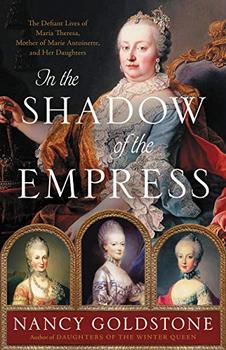Summary | Excerpt | Reading Guide | Reviews | Beyond the book | Read-Alikes | Genres & Themes | Author Bio

Portrait of a Woman
by Robert K. MassieThe extraordinary story of an obscure young German princess who traveled to Russia at fourteen and rose to become one of the most remarkable, powerful, and captivating women in history.
The Pulitzer Prize-winning author of Peter the Great, Nicholas and Alexandra, and The Romanovs returns with another masterpiece of narrative biography, the extraordinary story of an obscure young German princess who traveled to Russia at fourteen and rose to become one of the most remarkable, powerful, and captivating women in history.
Born into a minor noble family, Catherine transformed herself into Empress of Russia by sheer determination. Possessing a brilliant mind and an insatiable curiosity as a young woman, she devoured the works of Enlightenment philosophers and, when she reached the throne, attempted to use their principles to guide her rule of the vast and backward Russian empire. She knew or corresponded with the preeminent historical figures of her time: Voltaire, Diderot, Frederick the Great, Empress Maria Theresa of Austria, Marie Antoinette, and, surprisingly, the American naval hero, John Paul Jones.
Reaching the throne fired by Enlightenment philosophy and determined to become the embodiment of the "benevolent despot" idealized by Montesquieu, she found herself always contending with the deeply ingrained realities of Russian life, including serfdom. She persevered, and for thirty-four years the government, foreign policy, cultural development, and welfare of the Russian people were in her hands. She dealt with domestic rebellion, foreign wars, and the tidal wave of political change and violence churned up by the French Revolution that swept across Europe. Her reputation depended entirely on the perspective of the speaker. She was praised by Voltaire as the equal of the greatest of classical philosophers; she was condemned by her enemies, mostly foreign, as "the Messalina of the north."
Catherine's family, friends, ministers, generals, lovers, and enemies - all are here, vividly described. These included her ambitious, perpetually scheming mother; her weak, bullying husband, Peter (who left her lying untouched beside him for nine years after their marriage); her unhappy son and heir, Paul; her beloved grandchildren; and her "favorites" - the parade of young men from whom she sought companionship and the recapture of youth as well as sex. Here, too, is the giant figure of Gregory Potemkin, her most significant lover and possible husband, with whom she shared a passionate correspondence of love and separation, followed by seventeen years of unparalleled mutual achievement.
The story is superbly told. All the special qualities that Robert K. Massie brought to Nicholas and Alexandra and Peter the Great are present here: historical accuracy, depth of understanding, felicity of style, mastery of detail, ability to shatter myth, and a rare genius for finding and expressing the human drama in extraordinary lives.
History offers few stories richer in drama than that of Catherine the Great. In this book, this eternally fascinating woman is returned to life.
[Massie] carefully explains and analyzes memoirs, letters, and political essays from both Catherine and her contemporaries and demonstrates a literary critic's knack for extracting meaning from single phrases or words. In doing so, he creates a dramatic tension that is as good as any novel...continued
Full Review
 (569 words)
(569 words)
(Reviewed by Elizabeth Whitmore Funk).
The Memoirs of Catherine the Great
 These memoirs make for rewarding reading in their own right and are vastly supplemented by the dramas, letters, journalism, and political theory that she published in her lifetime. Though they were originally written in French, her preferred language, they have since been translated into numerous languages and published throughout the world.
These memoirs make for rewarding reading in their own right and are vastly supplemented by the dramas, letters, journalism, and political theory that she published in her lifetime. Though they were originally written in French, her preferred language, they have since been translated into numerous languages and published throughout the world.
If you liked Catherine the Great, try these:

by Anne Higonnet
Published 2024
Three women led a fashion revolution and turned themselves into international style celebrities.

by Nancy Goldstone
Published 2022
The vibrant, sprawling saga of Empress Maria Theresa - one of the most renowned women rulers in history - and three of her extraordinary daughters, including Marie Antoinette, the doomed queen of France.
Never doubt that a small group of thoughtful, committed people can change the world...
Click Here to find out who said this, as well as discovering other famous literary quotes!